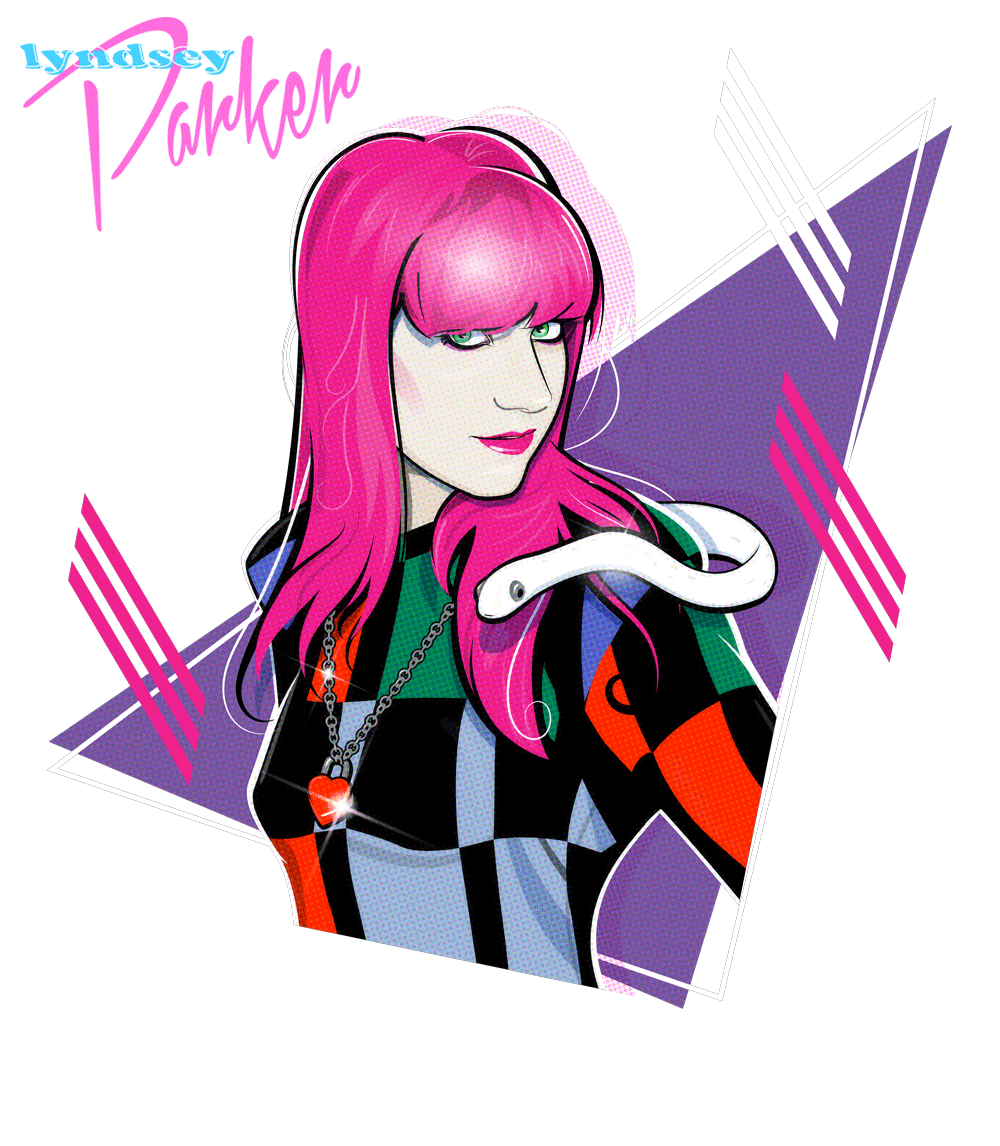Michelle Chamuel was never a typical reality show contestant. Openly gay, proudly nerdy, and deeply rooted in indie-rock and electronica, with two unsuccessful, unaired Voice auditions behind her, she seemed like the ultimate underdog — especially since her season, Season 4, was dominated by Blake Shelton’s country contestants, while she was a member of the-newbie coach Usher’s team.
But Michelle triumphantly made it all the way to second place that year, right in between Team Blake’s Danielle Bradbery and Swon Brothers. Still, she continued to march to the beat of her own drum machine. Instead of capitalizing on her newfound TV fame, the fiercely independent artist released her first post-Voice music under her EDM pseudonym, the Reverb Junkie, and she waited almost two years to release her full-length debut as Michelle Chamuel, Face the Fire.
Yahoo Music recently caught up with Michelle at South By Southwest, where she played two exquisite Face the Fire tracks for us and discussed her interesting journey — one that may eventually lead to a musical collaboration with her serious girlfriend, fellow heart-on-sleeve singer-songwriter Mary Lambert.
YAHOO MUSIC: Given your background in indie music, why did you choose to go on The Voice?
MICHELLE CHAMUEL: That is a lovely question… The reason I got into singing seriously was listening to the Dixie Chicks and Christina Aguilera, mainly Christina Aguilera. I was in 7th grade, singing the stuff over and over… The point of all this is there’s a show happening, and Christina is teaching people. I was like, “This is amazing; I would really like to be taught.” That pulled me to it, even though she wasn’t on the season I ended up auditioning again for, because it’s a process. I actually auditioned three times. She was there the first two, and then the third time I was like, “Cool, I would love to learn from anyone here, please teach me more.”
Why do think your first two auditions on The Voice weren’t successful?
I can only guess. The first one, I made it through a couple of rounds and then the questions come in. The Voice is great as far as wanting it to be a more symbiotic relationship. So they ask, “Why do you want to do The Voice? Why are you the voice? Why are you excited?” I’m like, “I think anyone can be the voice.” And they’re like, “OK, can you tell us more about you?” I’m like, “No.” So they’re like, “All right, maybe we’ll see you next time.” So that was that. Next time, I was thinking maybe I should think about this a little differently; I can open up my perspective and engage in a different way. So I tried again, and made through to the Blind Audition stage. I got really overwhelmed. Art is really sacred to me. It was happening so fast. I got stressed-out and I caught the flu. I did the audition with the flu. The show must go on! It sounded like I had a weird voice, but I was OK. They all turned around afterward and said, “Something was kind of strange.” I said, “I agree,” and I left. The show asked me to try again, if I wanted to. I thought about it for a long time. It’s a great chance to learn something.
What’s the best lesson you learned from your experience on The Voice?
To tie this back around, when I got the flu the first time, I was really stressed-out when nobody turned around. I didn’t engage with them. I just kind of left. But there are a lot of people to meet and a lot of people to talk to. Having fun and just being in the moment, even if it’s what you didn’t necessarily expect or hope for. That doesn’t mean it’s not a chance to meet somebody, ask a question, share something, or learn some things. It’s a pretty good takeaway.
Your Voice season was dominated by country music. Why do you think you stood out?
I don’t know. I was surprised to continually be on the show. I think that might be some of it. I wasn’t there to be on the show. I was there to do my thing. So maybe people were like, “All right, let’s give her another chance. We want to see what she does next week.” I wasn’t like, eyes on that prize. [More like] eyes on learning something. Feeling good about my performances. Meeting great people. That was the point.
Why did you keep a low profile after appearing on The Voice? Why did you release your first post-Voice music under the name the Reverb Junkie?
Why did you choose to go the independent route after the show?
That is a great question. I have so many thoughts on it. The way I view major-label stuff is it’s a certain type of job application. They’re offering a position. You can offer your stuff to be hired for it. But then you’re on their clock. A lot of people love that. It works out great for them. The two people are happy. With me, I’m different. I want to be spending a lot of time figuring out who I am before I push it out there. I don’t want to spend a lot time on the road and X, Y, and Z, or whatever it is I figure that works for me. It wouldn’t really be symbiotic. I try to find things where it would make both parties feel valued and happy. Some people are like, “Oh, it’s evil to do major-label things.” Or, “It’s silly to stay independent when you can’t achieve things.” The point is, they’re all different jobs. It’s just the type of job that you want to have. I’m working. I like my work. I feel like the people I work with hopefully also like what I do.
Is it kind of a blessing, in a way, that you did not win The Voice?
Yeah, for me. I think it’s for both parties involved, because I would have been an applicant for a job that wasn’t quite the right fit. For both parties, I think, it was good.
Were there any challenges being an openly gay contestant on a mainstream TV show like The Voice?
During the time of the show, the producers, at least when I was on it, were super-respectful. They came up to me and were like, “Do you want to talk about it?” I was like, “I feel like I just want to focus on the music right now. People can look me up and find out really easily, so if they would like to do that, that’s totally on them. I’m here to talk about music.” It’s not just about the gay contestant or not. It’s not about even being pigeonholed or anything. It’s just like, I’m here to talk about music. If someone wants to talk to me off-camera about something else, I’m super-stoked. During the show, there weren’t any issues about it. You are who you are. So if someone is like, “Why is she wearing a suit? Let me look it up. Oh, cool.” I think I became more like, in people’s mind: “Oh, cool she’s representing the gay community on the show.” And in a way I am. I’m representing women. I’m representing everything that I am. I’m not the spokesperson for it.
There are different types of artists. There are the people that speak out very much about it. We need that. It’s a part of the art that they make. I have so much respect for that. There are other artists that do their thing and hope that by just being themselves, they’re also helping making space in the world for other people to be themselves. I go in that second category. I’m not necessarily explaining all the things that I am that are different. But by putting out this art that is me and just being me, I hope that will help change the world and breed compassion. I think it’s nice to have the two of them together. I believe there are people that probably would like me to be more outspoken in it, because when you have visibility, it is important. I’m speaking out in my own way by not conforming to things that are asked of me. Whether it’s “be more political,” or “be less political,” I’m just going to be me. I hope that encourages other people to do that. When people are cool with themselves, they’re usually nicer to other people and more accepting. That’s my method.
Do you think you and your girlfriend, Mary Lambert, will ever collaborate musically?
We hope so. We keep talking about a musical and all this stuff. She’s one of the [gay] artists that speaks out. I think that’s so important as well. We talk about it all the time. We’re still trying to figure out individually what kind of music, we know who we are, that sonic imprint. As we develop that I’m sure we’ll find more and more ways to collaborate.
Follow Lyndsey on Twitter, Instagram, Facebook, Google+, Amazon, Tumblr, Vine, Spotify
This article originally ran on Yahoo Music.



